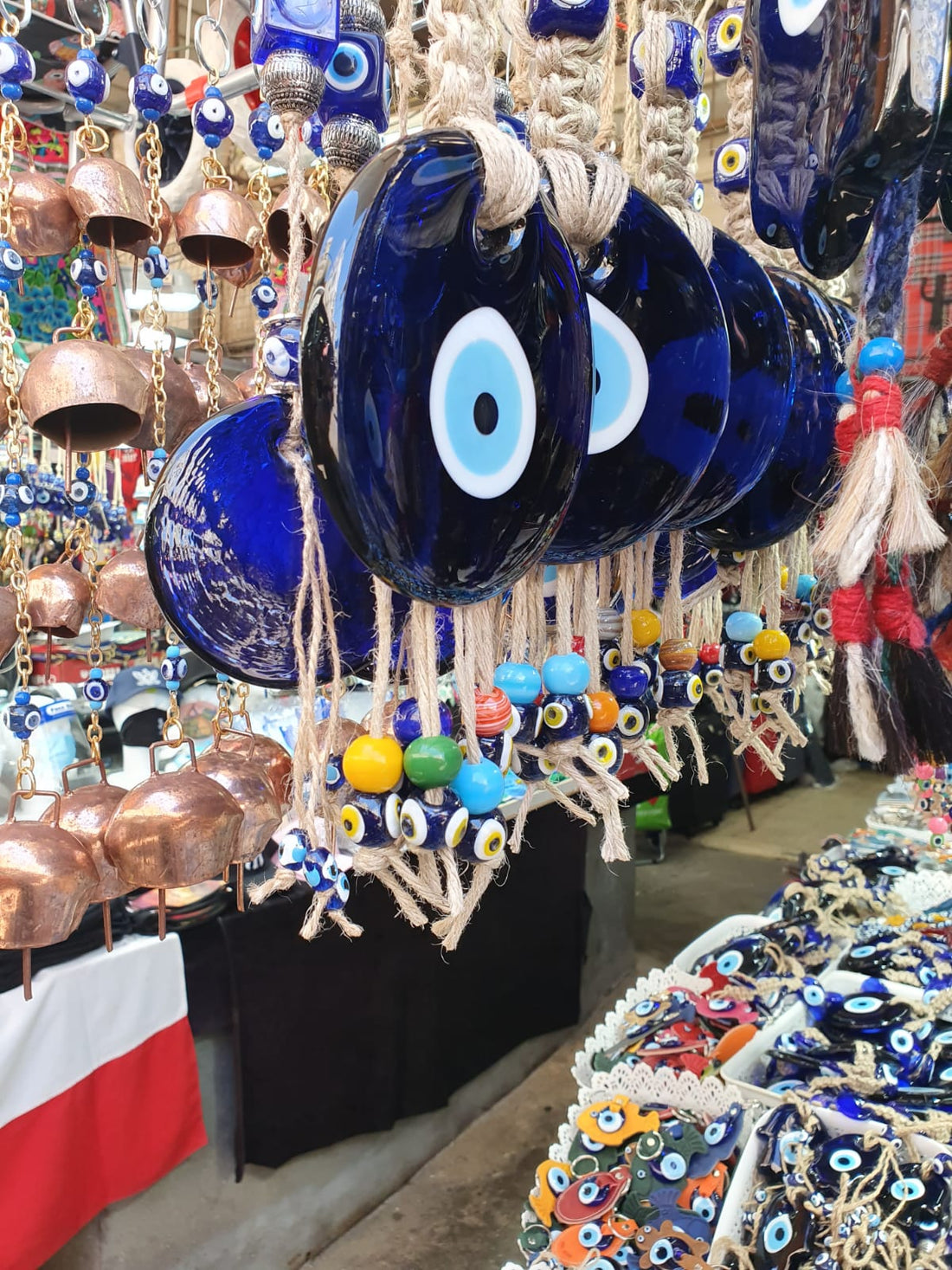
The History of the Evil Eye, an Ancient Symbol of Protection
Share
What is the evil eye symbol?
Evil eye jewelry and amulets for protection?
The evil eye may actually have originated as early as the Upper Paleolithic age. This figure is found in Jewish, Christian, and Muslim cultures as well as Buddhist and Hindu societies.
In different languages, the evil eye is known as:
- Hebrew Evil Eye – Ayin Ha’ra
- Turkish Evil Eye – Nazar Boncugu
- Italian Evil Eye – Mal Occhio
- Farsi – Bla Band
- Arabic – Ayin Harsha
- Scotland – Droch Shuil
- Spanish – Mal Ojo or El Oja
- France – Mauvais Oeil
- Germany – Böser Blick
- Romans – Oculus Malus
The evil eye "mal de ojo", Nazar "mauvais oeil" or greek "matiasma" is a curse believed to be caused by a malevolent glare, which is usually directed towards a person who is unaware. Many cultures believe that receiving the evil eye will cause one misfortune, bad luck, or injury.
Mal de Ojo jewelry and talismans created to protect against the evil eye are also frequently called "evil eyes".
How to get rid of the evil eye? Evil eye color meaning?
Blue: The color of evil eye protection. The traditional color for good karma, positive energies, and protection against the evil eye.Light Blue: Color of the sky – symbolizes truth and therefore it provides direct protection against the evil eye.
The 'evil eye' 'mati' 'ojo Turco' 'Nazar' the tradition of the charm persists, for new babies, new businesses, housewarmings, and even new cars – any occasion when a 'good luck' wish is called for.
- The real story behind the evil eye beads or lucky eye beads.
- Why the blue evil eye bead is more than just a good luck charm. How to get rid of somebody's bad eye?
At almost every stage of human history, man has looked for the assistance of magic objects called talismans to defy evil forces. So what does the evil eye mean?

What is the evil eye necklace meaning or why people wear evil eye bracelet and evil eye necklace?
The evil eye is a curse believed to be cast by a malevolent glare, usually given to a person when they are unaware. Many cultures believe that receiving the evil eye will cause misfortune or injury. Talismans created to protect against the evil eye are also frequently called "evil eyes".
The idea expressed by the term causes many different cultures to pursue protective measures against it. The concept and its significance vary widely among different cultures, primarily in West Asia. The idea appears several times in translations of the Old Testament. It was a widely extended belief among the many Mediterranean and Asian tribes and cultures. Charms and decorations with eye-like symbols known as nazars, which are used to repel the evil eye are a common sight across Greece, Turkey, Egypt, Iran, Iraq, Lebanon, Morocco, Southern Italy (Naples), the Levant, and Afghanistan and have become a popular choice of souvenir with tourists.
How to protect yourself from the evil eye with an evil eye necklace or amulet?
It's believed that there are three types of evil eyes:
1.The first are unconscious evil eyes. These harm people and things, without intending to.
2. The second type intends to harm.
3.The third one is unseen, hidden evil which is the most scared one.
It was believed that this eye saw all the wickedness in the world and removed poverty and ignorance. When Horus opened its eyes the world was enlightened, when he closed, it became dark. From Egypt, the eye talisman had spread to the Mediterranean, the Middle East, and Europe. When anyone looks at what is excellent with an envious eye he fills the surrounding atmosphere with a pernicious quality, and transmits his own envenomed exhalations into whatever is nearest to him.
The bead reflects the evil intent back to the onlooker. It somewhat resembles an eye and it is said the typical blue color is a factor in protecting the user.
A blue eye can also be found on some forms of the hamsa hand jewelry, an apotropaic hand-shaped amulet against the evil eye found in the Middle East.
The blue evil eye beads underwent a widespread circulation in the region, being used by the Phoenicians, Assyrians, Greeks, Romans, and, perhaps most famously, the Ottomans. Though their usage was most concentrated in the Mediterranean and the Levant, through means of trade and the expansion of empires the blue eye beads began to find their way to all different corners of the globe.
In addition to the use of evil eye amulets, the Greeks also carry incense or across as evil eye protection amulet against evil eyes. The new mother will save the items under the pillow or head, including red, black or white lines, nails, gunpowder, bread, salt, garlic, rings, indigo blue, or a pair of silver buttons. Each of these objects has its significance, making it a good defense against evil eyes.
What do the colors mean?
In Turkey or in Greece and surrounding countries, the most popular evil eye charm color is blue. Turkey is in a dry part of the world, where water is precious -- with water things prosper and grow, and without it, things shrivel and die. The color blue reminds people of fresh, cool water.
In the Jewish faith, the color red is often associated with luck and good fortune, so red is also a popular color.





